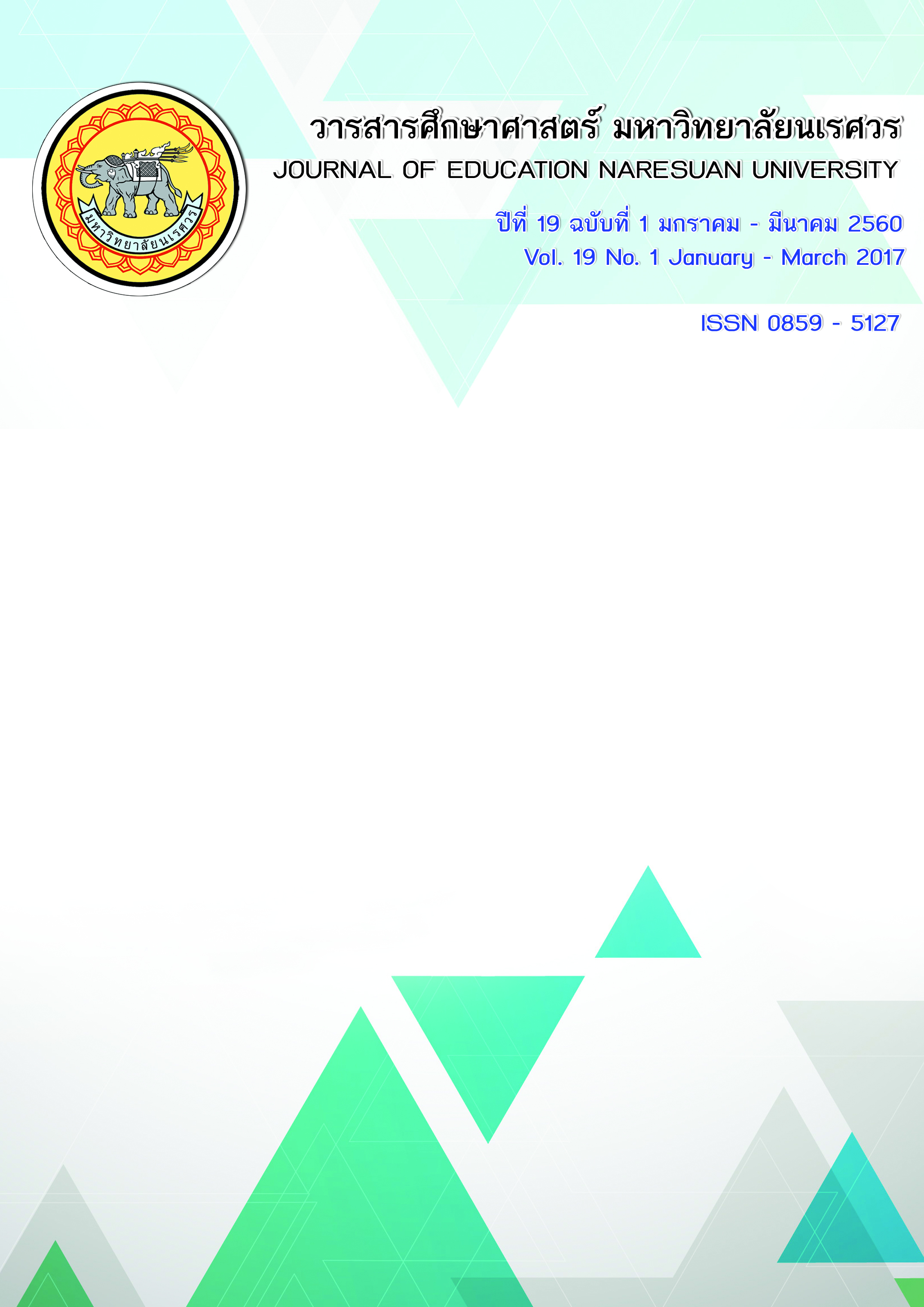การจัดการเรียนการสอนเศรษฐศาสตร์กับการจัดการมลพิษอย่างยั่งยืน สำหรับนิสิตปริญญาตรี มหาวิทยาลัยมหาสารคาม
Main Article Content
Abstract
การวิจัยนี้จึงมีความมุ่งหมาย คือ 1) เพื่อหาประสิทธิภาพคู่มือการจัดการเรียนการสอนเศรษฐศาสตร์กับการจัดการมลพิษอย่างยั่งยืน สำหรับนิสิตปริญญาตรี มหาวิทยาลัยมหาสารคาม มีประสิทธิภาพตามเกณฑ์ 80/80 2) เพื่อหาค่าดัชนีประสิทธิผลการเรียนการสอนเศรษฐศาสตร์กับการจัดการมลพิษอย่างยั่งยืนสำหรับนิสิตปริญญาตรี มหาวิทยาลัยมหาสารคาม 3) เพื่อเปรียบเทียบความรู้เกี่ยวกับเศรษฐศาสตร์กับการจัดการมลพิษอย่างยั่งยืน เจตคติต่อการอนุรักษ์สิ่งแวดล้อม และทักษะทางเศรษฐศาสตร์กับการจัดการมลพิษอย่างยั่งยืน ก่อนเรียนและหลังเรียนเศรษฐศาสตร์สิ่งแวดล้อมของนิสิตระดับปริญญาตรี มหาวิทยาลัยมหาสารคาม การวิจัยครั้งนี้เป็น การคัดเลือกกลุ่มตัวอย่างแบบเจาะจง จากนิสิตระดับปริญญาตรี สาขาวิชาสิ่งแวดล้อมศึกษา คณะสิ่งแวดล้อมและทรัพยากรศาสตร์ มหาวิทยาลัยมหาสารคามที่ลงทะเบียนเรียนรายวิชาเศรษฐศาสตร์สิ่งแวดล้อม ภาคต้น ปีการศึกษา 2557 จำนวน 63 คน เครื่องมือ ที่ใช้ในการวิจัย ได้แก่ คู่มือการจัดการเรียนการสอนเศรษฐศาสตร์กับการจัดการมลพิษอย่างยั่งยืนแบบทดสอบความรู้เกี่ยวกับเศรษฐศาสตร์กับการจัดการมลพิษอย่างยั่งยืน แบบวัดเจตคติต่อการอนุรักษ์สิ่งแวดล้อม แบบวัดทักษะเศรษฐศาสตร์กับการจัดการมลพิษอย่างยั่งยืน สถิติที่ใช้ในการวิเคราะห์ข้อมูล ได้แก่ ร้อยละ ค่าเฉลี่ย ส่วนเบี่ยงเบนมาตรฐาน และสถิติทดสอบสมมติฐาน Paired t-test ผลการศึกษา พบว่า คู่มือการจัดการเรียนการสอนเศรษฐศาสตร์กับการจัดการมลพิษอย่างยั่งยืน มีประสิทธิภาพเท่ากับ 91.56/90.00 ดัชนีประสิทธิผลของการจัดการเรียนการสอนเศรษฐศาสตร์กับการจัดการมลพิษอย่างยั่งยืน มีค่าดัชนีประสิทธิผลเท่ากับ 0.704 แสดงว่าหลังเรียนด้วยคู่มือนิสิตมีความก้าวหน้าในการเรียน ร้อยละ 70.40 และนิสิตที่เรียนด้วยการจัดการเรียนการสอนเศรษฐศาสตร์กับการจัดการมลพิษอย่างยั่งยืน มีความรู้เกี่ยวกับเศรษฐศาสตร์กับการจัดการมลพิษอย่างยั่งยืน เจตคติต่อการอนุรักษ์สิ่งแวดล้อม และทักษะทางเศรษฐศาสตร์กับการจัดการมลพิษอย่างยั่งยืนหลังเรียนสูงกว่าก่อนเรียน อย่างมีนัยสำคัญทางสถิติ ที่ระดับ .05
ECONOMICS AND SUSTAINABLE ENVIRONMENTAL MANAGEMENT EDUCATION OF UNDERGRADUATE STUDENTS AT MAHASARAKHAM UNIVERSITY
The purposes of this research were as follows: 1) to find efficient ways for economics and sustainable environmental management education for undergraduate students Mahasarakham University evaluated with an 80/80 performance efficiency criterion, 2) to find an effectiveness index of related educational measures, and 3) to compare the students' knowledge, attitudes towards environmental conservation, and skills in pre- and post-study in relation to management using economics. We selected as purposive samples 63 undergraduate students of the Faculty of Environment and Resources Studies, Mahasarakham University, who enrolled in the environmental economics subject in 2014. Tools for research were a manual for economics and sustainable environmental management, related lesson plans, summative tests, a test for attitude measurement towards environmental conservation, and the test for skill measurement on economics and sustainable environmental management.Statistics for data analysis were percentage, mean, standard deviation, and paired t-test.We found that: The developed educational processes were efficient at a 91.56/90.00 level.The effectiveness index was 0.704, and the undergraduates improved their learning outcomes by 70.40% after studying with the manual.
Article Details
The owner of the article does not copy or violate any of its copyright. If any copyright infringement occurs or prosecution, in any case, the Editorial Board is not involved in all the rights to the owner of the article to be performed.


